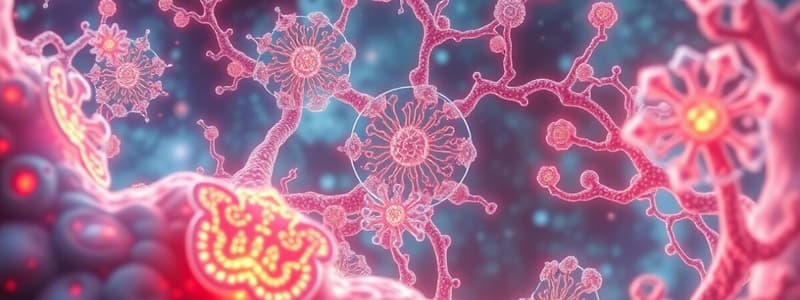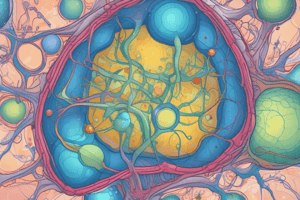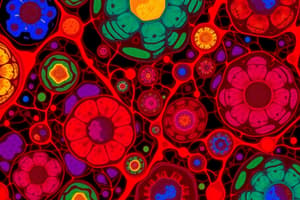Podcast
Questions and Answers
Which type of stem cells are capable of becoming any cell type including the placenta?
Which type of stem cells are capable of becoming any cell type including the placenta?
- Multipotent Stem Cells
- Oligopotent Cells
- Totipotent Cells (correct)
- Pluripotent Stem Cells
What distinguishes multipotent stem cells from pluripotent stem cells?
What distinguishes multipotent stem cells from pluripotent stem cells?
- Multipotent stem cells can become any cell type.
- Pluripotent stem cells only differentiate into adult tissues.
- Multipotent stem cells give rise to a limited set of cells. (correct)
- Pluripotent stem cells are more limited in the types they can become.
Which of the following stem cells is considered a type of adult stem cell?
Which of the following stem cells is considered a type of adult stem cell?
- Totipotent Stem Cells
- Induced Pluripotent Stem Cells
- Hematopoietic Stem Cells (correct)
- Embryonic Stem Cells
Induced Pluripotent Stem Cells (iPSCs) are derived from which source?
Induced Pluripotent Stem Cells (iPSCs) are derived from which source?
What term describes stem cells that are already committed to a specific lineage but are not yet terminally differentiated?
What term describes stem cells that are already committed to a specific lineage but are not yet terminally differentiated?
What is a significant technical problem associated with therapeutic cloning?
What is a significant technical problem associated with therapeutic cloning?
Which of the following is NOT an ethical concern regarding therapeutic cloning?
Which of the following is NOT an ethical concern regarding therapeutic cloning?
Who was awarded the Nobel Prize in Physiology or Medicine in 2012 for the discovery of reprogramming mature cells to become pluripotent?
Who was awarded the Nobel Prize in Physiology or Medicine in 2012 for the discovery of reprogramming mature cells to become pluripotent?
What are OSK transcription regulators necessary for?
What are OSK transcription regulators necessary for?
Which characteristic differentiates iPS cells from embryonic stem cells?
Which characteristic differentiates iPS cells from embryonic stem cells?
What must be done to the pluripotency factors in iPS cells for them to effectively differentiate?
What must be done to the pluripotency factors in iPS cells for them to effectively differentiate?
What is one of the outcomes of the expression of ~1500 genes in response to pluripotency regulators?
What is one of the outcomes of the expression of ~1500 genes in response to pluripotency regulators?
Which transcription factor is NOT part of the OSK group necessary for pluripotency?
Which transcription factor is NOT part of the OSK group necessary for pluripotency?
What is a potential risk associated with using somatic cells to create iPS cells?
What is a potential risk associated with using somatic cells to create iPS cells?
What type of stem cells are commonly used in clinical settings for cancer treatment?
What type of stem cells are commonly used in clinical settings for cancer treatment?
What significant discovery related to mouse genetics resulted in a Nobel Prize in Physiology/Medicine in 2007?
What significant discovery related to mouse genetics resulted in a Nobel Prize in Physiology/Medicine in 2007?
What role does leptin play in the body, as demonstrated by the leptin knockout experiment?
What role does leptin play in the body, as demonstrated by the leptin knockout experiment?
What technique involves using CRISPR/Cas9 with embryonic stem cells?
What technique involves using CRISPR/Cas9 with embryonic stem cells?
What is a challenge associated with the safety of reprogramming cells into iPS cells?
What is a challenge associated with the safety of reprogramming cells into iPS cells?
Which process is involved in transplanting adult hematopoietic stem cells into a patient?
Which process is involved in transplanting adult hematopoietic stem cells into a patient?
How do cultivated ES or iPS cells contribute to organoid development?
How do cultivated ES or iPS cells contribute to organoid development?
What is a primary characteristic of stem cells?
What is a primary characteristic of stem cells?
Which of the following accurately distinguishes embryonic stem cells from adult stem cells?
Which of the following accurately distinguishes embryonic stem cells from adult stem cells?
What is the concept of the 'stem cell niche'?
What is the concept of the 'stem cell niche'?
What challenge is commonly associated with the use of adult stem cells in therapy?
What challenge is commonly associated with the use of adult stem cells in therapy?
How can induced pluripotent stem cells (iPS cells) be generated?
How can induced pluripotent stem cells (iPS cells) be generated?
What potential utility of organoids is recognized in biomedical research?
What potential utility of organoids is recognized in biomedical research?
Which of the following is a basic scientific promise of stem cell biology?
Which of the following is a basic scientific promise of stem cell biology?
Which of the following diseases might benefit from stem cell therapy?
Which of the following diseases might benefit from stem cell therapy?
What is the role of the stem cell niche?
What is the role of the stem cell niche?
What is a primary challenge associated with the use of adult stem cells in therapy?
What is a primary challenge associated with the use of adult stem cells in therapy?
Which of the following statements accurately describes embryonic stem cells?
Which of the following statements accurately describes embryonic stem cells?
What ethical concern is associated with the use of embryonic stem cells?
What ethical concern is associated with the use of embryonic stem cells?
Why are adult stem cells considered challenging for therapy?
Why are adult stem cells considered challenging for therapy?
What is a characteristic feature of the inner cell mass (ICM) in a blastocyst stage mammalian embryo?
What is a characteristic feature of the inner cell mass (ICM) in a blastocyst stage mammalian embryo?
What is a common technical problem associated with embryonic stem cells?
What is a common technical problem associated with embryonic stem cells?
Which statement about the scarcity of adult stem cells is true?
Which statement about the scarcity of adult stem cells is true?
Flashcards
Stem cell
Stem cell
A cell that can make copies of itself and also develop into specialized cells from different tissues.
Self-renewal
Self-renewal
The process by which a stem cell divides to produce another stem cell and a cell that will differentiate into a specific cell type.
Differentiation
Differentiation
The process by which a stem cell becomes a specialized cell with a specific function, for example, a muscle cell or a blood cell.
Embryonic stem cells
Embryonic stem cells
Signup and view all the flashcards
Adult stem cells
Adult stem cells
Signup and view all the flashcards
Stem cell niche
Stem cell niche
Signup and view all the flashcards
Stem cell therapy
Stem cell therapy
Signup and view all the flashcards
Organoid
Organoid
Signup and view all the flashcards
Totipotency
Totipotency
Signup and view all the flashcards
Pluripotency
Pluripotency
Signup and view all the flashcards
Multipotency
Multipotency
Signup and view all the flashcards
Oligopotency
Oligopotency
Signup and view all the flashcards
Terminally differentiated cell
Terminally differentiated cell
Signup and view all the flashcards
What is stem cell niche?
What is stem cell niche?
Signup and view all the flashcards
What is self-renewal?
What is self-renewal?
Signup and view all the flashcards
What is differentiation?
What is differentiation?
Signup and view all the flashcards
What are embryonic stem cells?
What are embryonic stem cells?
Signup and view all the flashcards
What are adult stem cells?
What are adult stem cells?
Signup and view all the flashcards
What is the challenge of using adult stem cells?
What is the challenge of using adult stem cells?
Signup and view all the flashcards
What is reprogramming?
What is reprogramming?
Signup and view all the flashcards
What are stem cell applications?
What are stem cell applications?
Signup and view all the flashcards
Reprogramming
Reprogramming
Signup and view all the flashcards
iPS cells
iPS cells
Signup and view all the flashcards
Applications of iPS cells
Applications of iPS cells
Signup and view all the flashcards
Chemotherapy or radiation
Chemotherapy or radiation
Signup and view all the flashcards
Stem cell transplantation
Stem cell transplantation
Signup and view all the flashcards
Induced Pluripotent Stem Cells (iPSCs)
Induced Pluripotent Stem Cells (iPSCs)
Signup and view all the flashcards
Nuclear Transfer Stem Cells (NTSCs)
Nuclear Transfer Stem Cells (NTSCs)
Signup and view all the flashcards
OSK Transcription Regulators
OSK Transcription Regulators
Signup and view all the flashcards
Tumorigenesis
Tumorigenesis
Signup and view all the flashcards
Inner Cell Mass (ICM)
Inner Cell Mass (ICM)
Signup and view all the flashcards
Differences between iPSCs and ESCs
Differences between iPSCs and ESCs
Signup and view all the flashcards
Study Notes
Stem Cells
- Stem cells are capable of self-renewal, creating more stem cells and differentiated progeny.
- Stem cells demonstrate differences between embryonic and adult stem cells.
- The stem cell niche is the environment that produces signals to regulate stem cell proliferation and differentiation.
- Using adult stem cells or embryonic stem cells in therapy presents challenges.
- Induced pluripotent stem cells (iPS cells) can be generated.
- Organoids in biomedical research can be useful tools.
Learning Objectives
- Understanding stem cells' capacity for self-renewal and differentiation.
- Differentiating between embryonic and adult stem cells.
- Understanding the stem cell niche concept.
- Recognizing challenges of using stem cells in therapy.
- Understanding induced pluripotent stem cell generation.
- Recognizing organoids' potential as biomedical tools.
BIOMG1350 Course Information
- Prelim 4: December 9, 2024 (sections L19-24, S10-11). Room assignments available by Saturday, practice prelim will be uploaded, review sessions with TAs are scheduled (1-4 PM Saturday/Sunday in G01 Biotech).
- Final Exam: Saturday, December 14, 2024, 9:00 AM, at Barton Hall (BTN100CENT, BTN100EAST). Practice prelims may be available for review. Review sessions with TAs scheduled (1-3 PM) December 12th (Thursday) in Racker room G01 and December 13th (tentatively Warren Hall 101). Make-up exam requests due Wednesday, Dec 4th.
Quotes, Quotes, Quotes
- Quote by Alan Spradling (2001): People are fascinated with stem cells due to the potential of perpetual motion machines and the fountain of youth. Understanding stem cells could help realize their mythic promise. (Nature 414:98).
Stem Cell Excitement
- Basic science promise: The promises of stem cell biology include tissue homeostasis, controlling embryonic development, and regeneration, as well as dealing with aging.
- Clinical applications promise: Diabetes, cardiovascular diseases, Parkinson's, Alzheimer's, severe burns, spinal cord injuries, and more.
Stem Cell Definition
- Stem cell: A cell with a high capacity for self-renewal, creating more stem cells and differentiated progeny (offspring).
Types of Stem Cells
- Totipotent Cells: Makes all embryo cells and placenta.
- Pluripotent Stem Cells: Embryonic stem cells (ESCs) and induced pluripotent stem cells (iPSCs).
- Adult/Tissue Stem cells: Hematopoietic stem cells (HSCs), epidermal stem cells (EpSCs), Neural stem cells (NSCs)
- Multipotent Stem Cells: a type of stem cell with the ability to differentiate into a limited number of related cell types.
Adult Stem Cells
- Committed stem cells.
- Give rise to limited sets of cells and tissue types (multipotent).
- Examples include hematopoietic, epidermal, neural, hair, and melanocytes.
- Present throughout the life of the individual.
- Rare, difficult to isolate (approximately 1/1000 cells).
Stem Cell Niche
- Regulatory environment for adult stem cells.
- Produces signals that regulate stem cell proliferation and differentiation.
- Factors include niche cells, adhesive molecules, extracellular matrix (ECM) and basement membrane.
Stem Cell Niche in the Mammalian Intestine – Specialized environments
- Location of stem cells within the small intestine.
- Processes of stem cell proliferation and differentiation, including location in the crypt and the passage to the villus
Challenges Using Adult Stem Cells in Therapy
- Scarcity of adult stem cells to isolate.
- Need different kinds of adult stem cells for different treatments.
- Identifying the niche conditions necessary to maintain and differentiate adult stem cells.
- Adult stem cells grow poorly in culture and are difficult to expand.
Embryonic Stem (ES) Cells
- Derived from cells in embryogenesis.
- Can be cultured and maintained in a undifferentiated state.
- Can differentiate into any cell type in the body under appropriate conditions.
- Derived from a blastocyst (a pre-embryo stage).
- Inner cell mass (ICM) and trophoblast are parts of the blastocyst
- ICM gives rise to all cells of the developing embryo. Trophoblast gives rise to extra-embryonic tissues (like the placenta).
ES Cell Therapeutic Potential
- ES cells have remarkable therapeutic potential, despite obstacles.
Problems Associated with ES Cells in Therapy
- Technical problems:
- Histo-incompatibility (patient rejection).
- Unsure pathways to follow in differentiation.
- Ethical problems:
- Morality of creating human blastocysts for research. -Blastocyst status as a human individual
Induced Pluripotent Stem (iPS) Cells
- Mature cells, reprogrammed to become pluripotent.
- Nobel Prize in Physiology or Medicine (2012).
- Significant technique for producing iPS cells is culturing fibroblasts (skin) and introducing key transcription regulators (e.g. Oct4, Sox2, Klf4, c-Myc).
iPS Cell Uses
- Used in various research, particularly in genetic diseases.
- Creating iPS cells from patients with genetic diseases allows cell-based models to screen potential therapies for the disease.
iPS Therapy Challenges:
- Turning off pluripotency factors to permit differentiation to avoid tumorigenesis.
- iPS cells are not the same, due to variations in epigenetic marks.
- Stem cells can also have mutations.
- Reprogramming safety isn't fully clear yet.
- While seemingly straightforward, the process still has many challenges.
Nuclear Transfer Stem Cells (NTSCs)
- "Therapeutic cloning" technique.
- Uses cells from adult tissues and unfertilized eggs.
- Involved processes like cell fusion or nuclear injection.
- Results in personalized embryonic stem cells (ESCs).
Therapeutic Cloning Problems
- Low success rates need many donated eggs.
- Ethics surrounding human blastocyst creation.
Gene Knockout Experiments in Mice
- Researchers use gene knockouts in mice to investigate the role of specific genes.
- A gene knockout removes or disables a specific gene to see what happens without that gene.
- In the example cited, removing a gene that controls leptin production leads to obesity.
Stem Cells and Cancer
- Stem cells are potential cancer targets.
- Long lifespan and high proliferative capacity can increase mutation potential leading to transformation.
- Cancer stem cells are rare tumor cells and can rebuild a tumour.
- Stem cell regulatory signals, including quiescence, activation, and differentiation signals usually play a role in cancer, although how that role manifests depends on the cancer type.
Stem Cell Renewal and Pro-Cancer Pathways
- The processes for stem cell renewal are intertwined with pathways linked to cancer.
Studying That Suits You
Use AI to generate personalized quizzes and flashcards to suit your learning preferences.




